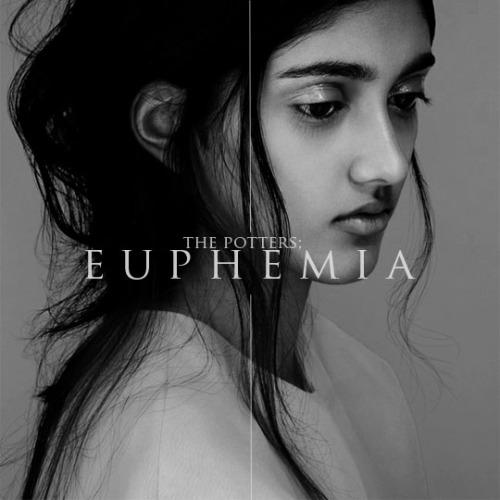The Potter Family
J. K. Rowling revela que Fleamont y Euphemia son los abuelos de Harry Potter, aunque él nunca los llegó a conocer.
Ésta es la noticia (traducida al español):
La familia Potter es muy antigua, pero nunca estuvo (hasta el nacimiento de Harry James Potter) en la vanguardia de la historia mágica, contentándose más bien con una existencia sólida y cómoda en los remansos.
Potter no es un apellido muggle raro, y la familia no estuvo en el llamado ‘Sagrados Veintiocho’ por esta razón; el compilador anónimo de esa lista supuestamente definitiva de sangre pura sospechaba que habían surgido de lo que él consideraba sangre contaminada. La familia Potter mágico tuvo ilustres orígenes, sin embargo, algunos de los cuales se insinuaron en Reliquias de la Muerte.
En el mundo muggle, ‘Potter’ es un apellido de trabajo, es decir, refiere a un hombre que crea la cerámica [pottery]. La familia de magos de Potters [alfareros] desciende del mago del siglo XII Linfred de Stinchcombe, un hombre localmente muy amado y excéntrico, cuyo apodo, “el Potterer”, se corrompió en el tiempo a ‘ Potter ‘. Linfred era un tipo vago y distraído cuyos vecinos muggles a menudo llamaban por sus servicios medicinales. Ninguno de ellos se dio cuenta de que las maravillosas curas de Linfred para la viruela y la fiebre intermitente eran mágicas; todos le creían un tío viejo inofensivo y amable, que se entretenía alrededor de su jardín con todas sus plantas raras. Su reputación como un excéntrico bienintencionado sirvió bien a Linfred, porque a puerta cerrada fue capaz de continuar la serie de experimentos que sentaron las bases de la fortuna de la familia Potter. Los historiadores acreditan a Linfred como el creador de una serie de remedios que evolucionaron en pociones siendo utilizados para el día de hoy, incluyendo Skele-gro y la poción Pepperup. Sus ventas de tales curas a compañeros brujas y magos le permitieron dejar una pila considerable de oro para cada uno de sus siete hijos a su muerte.
El hijo mayor de Linfred, Hardwin, se casó con una hermosa joven bruja con el nombre de Iolanthe Peverell, que procedía de la localidad del Valle de Godric. Ella era la nieta de Ignotus Peverell. A falta de herederos varones, ella, la mayor de su generación, había heredado la capa de invisibilidad de su abuelo. Era, Iolanthe explicó a Hardwin, una tradición en su familia que la posesión de esta capa se mantuviera en secreto, y su nuevo marido respetó sus deseos. A partir de entonces, la capa fue dejada para el hijo mayor de cada nueva generación.
Los Potter continuaron casándose con sus vecinos, de vez en cuando muggles, y viviendo en el oeste de Inglaterra, durante varias generaciones, y, cada uno añadiendo a las arcas de la familia por su arduo trabajo y, todo hay que decirlo, por la marca tranquila de ingenio que tenía caracterizado su antecesor, Linfred.
En ocasiones, un Potter hizo todo el camino a Londres, y un miembro de la familia se ha sentado dos veces en el Wizengamot: Ralston Potter, que fue miembro entre 1612-1.652, y que era un gran partidario del Estatuto del Secreto (como oposición a declarar la guerra a los muggles, como la mayoría de los miembros más militantes querían hacer) y Henry Potter (Harry entre sus íntimos), que era un descendiente directo de Hardwin y Iolanthe, y sirvió en el Wizengamot a partir de 1913 – 1921. Henry causó un revuelo menor cuando condenó públicamente al entonces Ministro de Magia, Archer Evermonde, que había prohibido a la comunidad mágica a ayudar a los muggles que libraban la Primera Guerra Mundial. Su franqueza en nombre de la comunidad Muggle también fue un fuerte factor que contribuyó a la exclusión de la familia de los”Sagrados Veintiocho ‘.
El hijo de Henry fue llamado Fleamont Potter. Fleamont se llamaba así porque fue el último deseo de la madre de Henry de perpetuar su apellido de soltera, que de lo contrario moriría. Él llevó la carga extraordinariamente bien; de hecho, él siempre atribuyó su destreza en el duelo con el número de veces que tuvo que luchar contra gente en Hogwarts después de que se habían burlado de su nombre. Fue Fleamont quien tomó el oro de la familia y lo cuadruplicó, mediante la creación de la poción mágica de pelo Sleekeazy (‘dos gotas doma incluso al barnet más molesto’). Vendió la empresa a un gran beneficio cuando se retiró, pero ninguna cantidad de riquezas que él o su esposa Eufemia por su falta de hijos podría compensar. Bastante habían perdido la esperanza de un hijo o hija cuando, para su sorpresa, Eufemia descubrió que estaba embarazada y su niño querido, James, nació.
Fleamont y Eufemia vivieron lo suficiente para ver a James casarse con una niña nacida de muggles llamada Lily Evans, pero no para conocer a su nieto, Harry. Una viruela de dragón se los llevó a los dos con pocos días de diferencia, debido a su avanzada edad, y James Potter así heredó la capa de invisibilidad de Ignotus Peverell.
Y esta es la noticia original:
The Potter family is a very old one, but it was never (until the birth of Harry James Potter) at the very forefront of wizarding history, contenting itself with a solid and comfortable existence in the backwaters.Potter is a not uncommon Muggle surname, and the family did not make the so-called ‘Sacred Twenty-Eight’ for this reason; the anonymous compiler of that supposedly definitive list of pure-bloods suspected that they had sprung from what he considered to be tainted blood. The wizarding Potter family had illustrious beginnings, however, some of which was hinted at in Deathly Hallows.In the Muggle world ‘Potter’ is an occupational surname, meaning a man who creates pottery. The wizarding family of Potters descends from the twelfth-century wizard Linfred of Stinchcombe, a locally well-beloved and eccentric man, whose nickname, ‘the Potterer’, became corrupted in time to ‘Potter’. Linfred was a vague and absent-minded fellow whose Muggle neighbours often called upon his medicinal services. None of them realised that Linfred’s wonderful cures for pox and ague were magical; they all thought him a harmless and lovable old chap, pottering about in his garden with all his funny plants. His reputation as a well-meaning eccentric served Linfred well, for behind closed doors he was able to continue the series of experiments that laid the foundation of the Potter family’s fortune. Historians credit Linfred as the originator of a number of remedies that evolved into potions still used to this day, including Skele-gro and Pepperup Potion. His sales of such cures to fellow witches and wizards enabled him to leave a significant pile of gold to each of his seven children upon his death.Linfred’s eldest son, Hardwin, married a beautiful young witch by the name of Iolanthe Peverell, who came from the village of Godric’s Hollow. She was the granddaughter of Ignotus Peverell. In the absence of male heirs, she, the eldest of her generation, had inherited her grandfather’s invisibility cloak. It was, Iolanthe explained to Hardwin, a tradition in her family that the possession of this cloak remained a secret, and her new husband respected her wishes. From this time on, the cloak was handed down to the eldest in each new generation.The Potters continued to marry their neighbours, occasionally Muggles, and to live in the West of England, for several generations, each one adding to the family coffers by their hard work and, it must be said, by the quiet brand of ingenuity that had characterised their forebear, Linfred.Occasionally, a Potter made it all the way to London, and a member of the family has twice sat on the Wizengamot: Ralston Potter, who was a member from 1612-1652, and who was a great supporter of the Statute of Secrecy (as opposed to declaring war on the Muggles, as more militant members wished to do) and Henry Potter (Harry to his intimates), who was a direct descendant of Hardwin and Iolanthe, and served on the Wizengamot from 1913 - 1921. Henry caused a minor stir when he publicly condemned then Minister for Magic, Archer Evermonde, who had forbidden the magical community to help Muggles waging the First World War. His outspokenness on the behalf of the Muggle community was also a strong contributing factor in the family’s exclusion from the ‘Sacred Twenty-Eight’.Henry’s son was called Fleamont Potter. Fleamont was so called because it was the dying wish of Henry’s mother that he perpetuate her maiden name, which would otherwise die out. He bore the burden remarkably well; indeed, he always attributed his dexterity at duelling to the number of times he had to fight people at Hogwarts after they had made fun of his name. It was Fleamont who took the family gold and quadrupled it, by creating magical Sleekeazy’s Hair Potion ( ‘two drops tames even the most bothersome barnet’ ). He sold the company at a vast profit when he retired, but no amount of riches could compensate him or his wife Euphemia for their childlessness. They had quite given up hope of a son or daughter when, to their shock and surprise, Euphemia found that she was pregnant and their beloved boy, James, was born.Fleamont and Euphemia lived long enough to see James marry a Muggle-born girl called Lily Evans, but not to meet their grandson, Harry. Dragon pox carried them off within days of each other, due to their advanced age, and James Potter then inherited Ignotus Peverell’s Invisibility Cloak.
Este es el link de la noticia, para leer más noticias de J. K. Rowling, puedes ir aquí.


¡Espero que os haya gustado! Compartid el blog, dejad un comentario dando vuestra opinión y, si queréis alguna entrada en particular, me lo podéis decir también :). ¡Muchas gracias! -C


0 comments